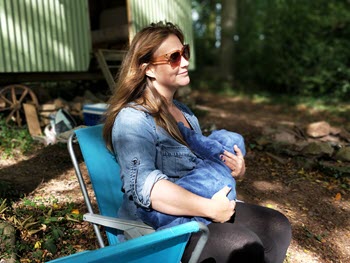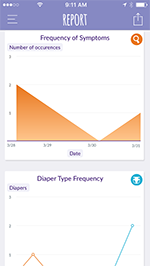
neocate.com
Breastfeeding with food allergies can get complicated if your baby is diagnosed with an allergy to cow milk, or when other food allergies are suspected. So, what can you do when you have a milk-allergic infant and breastfeeding is your goal?
Breast milk is the best source of nutrition for your baby.
It is the first choice of the World Health Organization (WHO), the American Academy of Pediatrics (AAP), the Centers for Disease Control and Prevention (CDC), and healthcare teams worldwide. However, when your baby is diagnosed with or suspected of having a milk allergy, your baby’s diet must change.
Is it possible to manage your baby’s food allergies while sticking to your plan for her to breastfeed? Absolutely. Let’s look at a few scenarios and possible solutions.
My infant seems to react to foods I’m eating when breastfeeding with food allergies.
Answer: Ask your healthcare team for their advice.
It’s possible for fragments of protein from foods in mom’s diet to make their way into her breast milk. Trace amounts passed on through breast milk can cause allergic reactions if the infant develops an allergy to those foods.
The first option your healthcare team may suggest is for mom to follow an elimination diet and for baby to continue to breastfeed. Here’s what you need to know about a maternal elimination diet:
- THE BASICS: Strictly avoid certain foods that the healthcare team identifies. You remove suspected allergens – both whole foods and some ingredients – from your diet. This removes the potential allergen from your breast milk, thus removing the allergens from your baby’s diet.
- ASK FOR ADVICE: Check with the healthcare team and follow their advice for an elimination diet. They can provide detailed and tailored instructions on what foods you should eliminate and how to avoid them. It helps to make a list of questions to ask – here are some suggestions to help prepare for the appointment.
- KNOW THE LIMITS: Ask the healthcare team to explain what should improve with the elimination diet and how quickly. Ask the healthcare team what nutrients you may not be getting enough of. (See below: more foods eliminated = greater risk of nutrient deficiency!)
Often the healthcare team will recommend starting out by eliminating just milk, or a few items like milk and soy. This step could include eliminating foods containing certain ingredients derived from milk and soy.
If your baby’s symptoms don’t fully improve, then additional foods may need to be eliminated from your diet. This may be referred to as a Total Elimination Diet (TED). Read more about Rachel, a mom, and her experience with TED.
It is key that you maintain a healthy diet throughout the elimination process. Eliminating some foods, especially large food groups like dairy, may jeopardize your health. It is important to seek medical supervision from your doctor and/or a registered dietitian when planning an elimination diet.
Depending on the number of foods you eliminate, supplements of certain nutrients may be needed:
This can be key to prevent nutrient deficiencies. For example, if you’re avoiding dairy your healthcare team may recommend supplements of calcium and vitamin D. Remember: the more foods eliminated, the greater the risk of nutrient deficiencies, and the more nutrients at risk.
In some instances, healthcare teams have recommended Neocate as a hypoallergenic option to supplement mom’s diet. In this way, the baby can continue to breastfeed and mom has a supplemental source of nutrition. This might be particularly helpful when mom eliminates multiple foods from her diet or follows a Total Elimination Diet.
I am not producing enough breast milk to breastfeed with food allergies
Answer: Ask your healthcare team for their advice.
Some mothers struggle to produce enough breast milk to meet the needs of their growing baby. In this case, many healthcare teams recommend supplementing with infant formula. That gives the baby the benefits of breast milk while also providing enough calories and nutrients to support her growth. Mom can nourish the infant while the healthcare team helps address any factors behind the low breast milk yield.
Hypoallergenic Formula, when breastfeeding with food allergies.
The team may recommend a hypoallergenic formula like Neocate to supplement your breast milk if your little one has had symptoms to your breast milk. That’s because guidelines advise that babies who have not tolerated breast milk due to food allergies should take a hypoallergenic formula like Neocate when a supplement for mom’s breast milk is needed.
Your healthcare team such as your pediatrician or registered dietitian will advise you on what your baby needs.
The amount of formula needed should be directed by your healthcare team and will be unique to your infant’s individual nutrition needs.
Supplementing breast milk with Neocate can help you continue to provide your baby the wonderful nutrition from breast milk, while also making sure your baby gets the full amount of calories and nutrients they need to continue to grow and develop from a hypoallergenic formula.
However, this can also present some challenges. Babies often have a hard time switching between breastfeeding and bottle feeding. I hear from many mothers in this situation that the baby will often prefer one feeding over the other, and usually the baby prefers breast milk. For example moms have told me that their baby drinks well when they are breastfeeding but they struggle with bottle feedings. Even mothers that are exclusively bottle feeding will often say that the baby prefers the bottles of breast milk over the bottles of infant formula.
Some Tips for Mom Supplementing Breast milk for Breastfeeding with food allergies. When Feeding Her Milk-allergic Infant:
- Many healthcare teams suggest manually expressing your breast milk and bottle feeding only to help in this situation.
- Teams often recommend adding prepared Neocate consistently to the bottles with expressed breast milk. This can help with bottle acceptance because the bottles are consistently the same taste and the infant is consistently being bottle fed.
- Your healthcare team should recommend the amount of prepared Neocate. They base it on the nutrition needs of your baby and your breast milk production.
For example, let’s say the healthcare team advised that your baby needs an additional 10 fluid ounces of Neocate daily. If your baby takes 5 bottles a day, your healthcare team might recommend adding 2 fluid ounces of prepared Neocate to each bottle of expressed breast milk. You would prepare the Neocate at the recipe recommended by your healthcare team, then add 2 fluid ounces to each bottle of breast milk. This ensures the baby is getting a similar blend of breast milk and Neocate at each bottle.
Again, your healthcare team will direct you regarding what is best for both you and your little one, so ask your pediatrician or registered dietitian for what is best for you.
I am adding prepared Neocate to breast milk, but my baby is not gaining weight.
Answer: Ask your healthcare team for their advice.
For some infants, the calories in breast milk or formula may not be enough to support weight gain at a normal rate. When your baby can’t consume any more breast milk or formula in a day, the healthcare team may suggest other options to help your baby gain weight and keep on track with their expected weight gain, or growth curve. (Did you know? You can track your baby’s intake using the Neocate Footsteps App, so you can show the healthcare team exactly what she’s taking.)
Often the healthcare team might recommend an increase in calories.
One option they might advise is concentrating the Neocate before adding it to your breast milk.
This can help increase the calories and nutrients your baby gets from Neocate, on top of breast milk. The same tips discussed above can be helpful in this situation when expressing your breast milk, especially adding the Neocate to your breast milk consistently between bottles.
Again, your pediatrician or registered dietitian will advise you what is best for you and your baby, and how exactly they want you to prepare Neocate before adding it to your expressed breast milk. HCP’s can guide you through breastfeeding with food allergies. This is important because the formula that is too concentrated can lead to dehydration and other health issues. In other words, consult the healthcare team first – please do not do this on your own!
What other questions do you have about your babies food allergies and breastfeeding?
Please share any questions or any suggestions you might have for other mothers facing this situation in the comments below.
-Kristin Crosby MS, RDN, LDN
Originally posted 8.9.16, Updated 9.19.17







